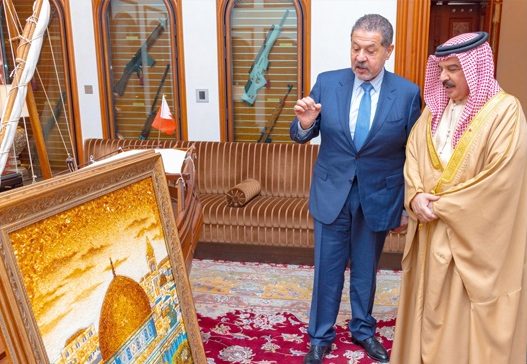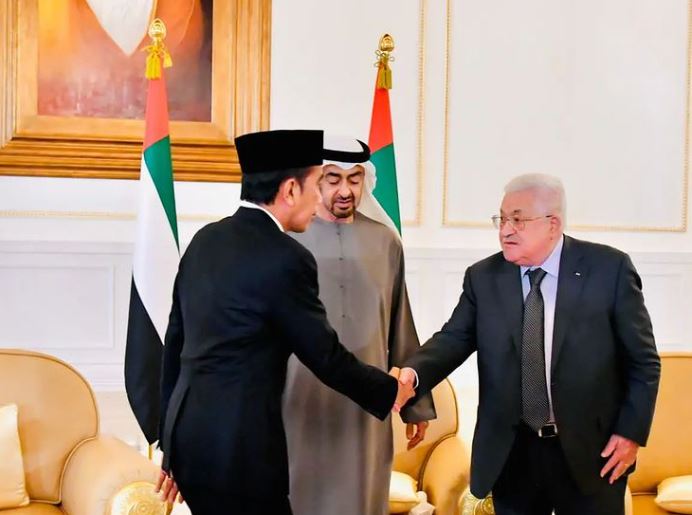The Palestinian Authority leadership seeks to ease the tensions between the PA and the UAE and Bahrain – tensions that escalated after the Abraham Accords were signed.
Should Israel be concerned about the expected rapprochement, or should it rather try to take advantage of the opportunities that might ensue?
By Yoel Guzansky and Kobi Michael, INSS
INSS Insight, No. 1607, June 7, 2022
Recent indications suggest that the Palestinian Authority is eager to ease tensions with some Arab Gulf states – tensions that escalated after the Abraham Accords were signed. To be sure, the poor relations and bad blood, especially between PA head Mahmoud Abbas and United Arab Emirates President Mohammed bin Zayed, challenge a fresh start anytime soon. Nonetheless, the recent developments, insofar as they suggest a turning point in relations between the parties, are likely to have a considerable impact on the Palestinian arena and Israeli interests.
Recent developments suggest a change in the attitude of the Palestinian Authority (PA) toward a number of Arab Gulf states – developments that may signal a desire on the part of the PA and its leaders to repair the difficult relations with these countries. PA head Mahmoud Abbas sent his son, Yasir Abbas, who has no official position, to Bahrain on May 9, 2022 for a meeting with King Hamad bin Isa al Khalifa. Even before the meeting, the Palestinians returned their ambassadors to Manama and Abu Dhabi, after recalling them to Ramallah following the signing of the Abraham Accords. A week later, on May 15, Abbas chose to lead a high-level Palestinian delegation on a condolence call to the United Arab Emirates (UAE), following the death of the president, Sheikh Khalifa bin Zayed. This visit was an opportunity for Abbas to meet with incoming President Mohammed bin Zayed, following a prolonged rift between the two men, and congratulate him on taking office. Abbas had not visited UAE for many years.
<
>
Underlying the PA’s efforts to repair its relations with the UAE is its strategic weakness and the strengthening of Hamas; the ongoing erosion in the PA’s public support; its loss of effective governance in the outlying areas of the West Bank (particularly in the Jenin area); budget difficulties caused by cuts in international and Arab support; the political stalemate with Israel; a substantial decline in the interest in and solidarity with the Palestinian cause within the Arab world; and a lowering of the PA’s expectations that the US administration will exert pressure on Israel in the Palestinian context.
Despite efforts by the Palestinians in the past two years to lessen the tension with Arab Gulf states, particularly the UAE, Abu Dhabi has so far taken no steps to warm their relations. The UAE has been in no hurry to forgive, and President Mohammed bin Zayed will likely not be easily convinced to accept the Palestinian reconciliatory efforts.
 <
<
>
The relations between the UAE and Bahrain on the one hand and the PA on the other have deteriorated particularly since the signing of the Abraham Accords, which the Palestinians regarded as a stab in the back and a “betrayal of the Palestinian people” before a settlement of the Israeli-Palestinian conflict was achieved. The instituting of ties with Israel further aggravated the suspicion and hostility that prevailed between the PA and UAE due to Abu Dhabi’s support over many years for Mohammad Dahlan, Abbas’s bitter enemy, and its preference for financial support to Dahlan, rather than direct support for the PA. The Palestinian leadership, especially Abbas and his associates and supporters, have not accepted Dahlan’s welcome in the UAE, where he has lived since his expulsion from Fatah and served as a close adviser to Mohammed bin Zayed. The Palestinian leadership even blames Dahlan for bin Zayed’s decision to go ahead with the normalization agreement with Israel.
As justification for forging relations with Israel, and in order to assuage Palestinian and Arab criticism, the UAE asserted publicly that the Abraham Accords had in effect prevented Israel from going ahead with its plan to annex territory on the West Bank, because the suspension of the plan was portrayed as a condition for normalization. For their part, the Palestinians rejected this explanation, and regarded the Abraham Accords as a means of promoting UAE interests at the expense of the Palestinian national interest. Normalization with Israel was portrayed as abandonment of solidarity with the Palestinians. In response, the Palestinians even took action to prevent any UAE involvement in the East Mediterranean Gas Forum (EMGF).
The PA itself is refusing to take part in regional economic, infrastructure, and energy initiatives based on the Abraham Accords, and has rebuffed offers of aid from the UAE. In response to the Palestinian criticism, the UAE dramatically cut its aid to the United Nations Relief and Works Agency for Palestine Refugees in the Near East (UNRWA), but the estrangement with the PA also harmed the UAE, because it had a negative impact on its ability to consolidate influence in the PA territories, inter alia as a counterweight to Qatar’s growing influence.
 <
<
>
For Qatar, which despite their reconciliation agreement is still competing with the Gulf states, involvement in the Palestinian arena is an important means of consolidating its standing. Qatar’s primary leverage with both Israel and Hamas is its economic power. There is tension, however, between Israel’s interest in security tranquility in the Gaza Strip sphere through improvement in the humanitarian situation in the Gaza Strip via aid from Qatar and Qatar’s negative contribution to events in the conflict arena resulting from Doha’s support for Hamas and the Muslim Brotherhood, and its involvement in incitement against Israel through the al-Jazeera network. Furthermore, Israel has an interest in proper relations with Egypt, Saudi Arabia, and the UAE, which opposed Qatar’s ambitions to further its regional standing, in part through its involvement in the Gaza Strip and its influence on Hamas.
Due to its relative weakness in the Palestinian theater, whether because of its refusal to talk to Hamas or because of the grudge between it and the PA leadership on the West Bank, the UAE is hard pressed to play a moderating role in this theater. The UAE is focused on humanitarian aid and the dispatch of medical and other equipment to the PA and the Gaza Strip, which it did at the peak of the COVID-19 pandemic.
Nevertheless, the crisis of confidence and the UAE’s limited motivation to exert a significant effort in the Palestinian theater, including a renewal of financial aid to the PA, will hamper efforts to make a fresh start. For the UAE, increased involvement in the Palestinian arena incurs a price in terms of political and financial resources. On the other hand, under certain conditions, a change in the UAE’s attitude is possible, for example, if it can become involved in an attempt to involve the PA in regional infrastructure and economic ventures leading to United States support and cooperation with Israel, Jordan, and Egypt, and which limit the influence of Qatar and strengthen the UAE’s regional and international standing.
<
>
A rapprochement between the PA and the UAE and Bahrain will be compatible with a number of important Israeli and regional interests, and could have significant implications for the Palestinian arena:
-
- A renewal of the political process – new influential parties may integrate the political process in the emerging regional order, and as part of it, also further regional economic, infrastructure, and energy initiatives based on the Abraham Accords that will serve both Israeli and Palestinian interests.
-
- The potential for reducing Qatar of its standing in the Palestinian arena – especially its involvement in both the Gaza Strip and the West Bank, or at least creating an alternative to its influence.
-
- Encouragement of Saudi Arabia to join the normalization process with Israel, thereby bolstering its involvement in the Palestinian theater.
The PA’s renewed rapprochement with the UAE and Bahrain may indicate Palestinian disillusionment with the fantasy of rolling back the process of Israel’s integration in the region, while at the same time achieving inter-organizational reconciliation with Hamas. Israel should therefore encourage the “normalization” trend between the PA and the UAE and Bahrain, in view of the positive potential of this trend for its interests. Israel should attempt to influence its Gulf friends to repair these relations, in the understanding that this will bolster the strengthening of relatively moderate groups in the Palestinian theater at the expense of radical groups like Hamas. This will increase the likelihood of a renewal of the Israeli-Palestinian political process as an element in shaping the new regional order.
<
>



The problem is not so much about the “Arabs” but the vast international antisemitism.
How many countries in the world have considered the Abraham accords as a positive development in that area of the world and show support for the accords?